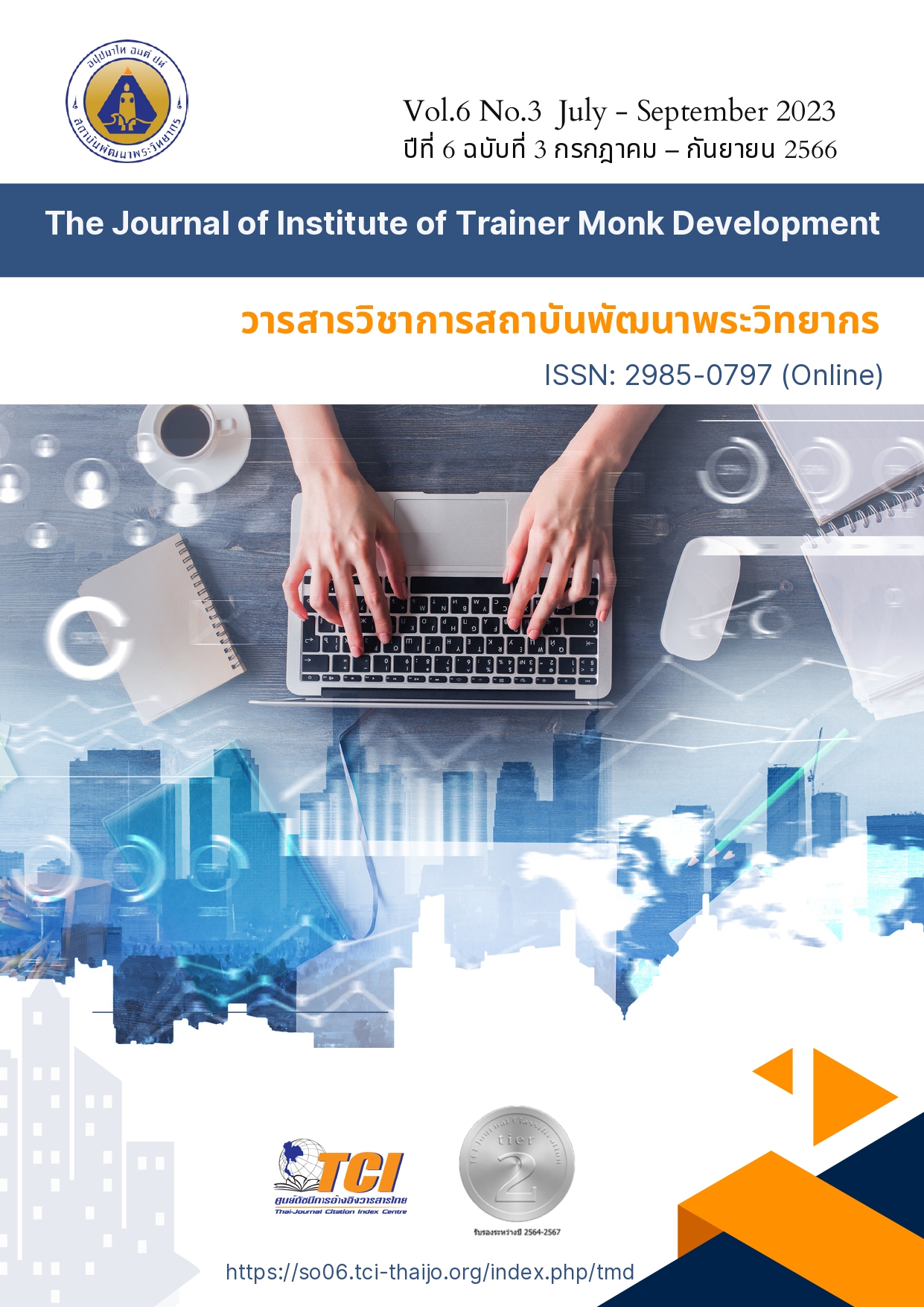Driving of Dhamma’s Doctrine in Buddhism and Anti-Corruption Education at The Sangha Administration Region 1
Main Article Content
Abstract
This research article has three objectives: (1) to study the principles of Buddhist teachings related to preventing and suppressing corruption; (2) To study the anti-corruption education related to preventing and suppressing corruption. (3) To promote the principles of Buddhist teachings with the anti-corruption education in the Sangha Administrative Region 1. It is a quantitative research survey to the results were analyzed from 700 monks in the Sangha Administrative Region 1. The research results found that the Buddhist teachings that are used to prevent and suppress corruption, they are 4 Padhàna or the Four Great Efforts, consist of (1) Sangwara Padhàna (effort to prevent) (2) Pahàna Padhàna (effort to abandon) (3) Bhàvana Padhàna (effort to develop) (4) Anurakkhanà Padhàna (effort to maintain). These principles of 4 Padhàna can be divided into 2 processes: the process of stopping and extinguishing the corruption problem by using Sangwara Padhàna and Pahàna Padhàna, and the process of creating a culture of honesty through the use of Bhàvana Padhàna and Anurakkhanà Padhàna. As for Anti-Corruption Education, there are 4 sections, consist of (1) Synthesis Thinking between individual interests and public interests (2) moral shame and moral dread, non-cooperation in corruption (3) sufficient mentality resists corruption with the STRONG model (4) population and social responsibility. This anti-corruption education will integrate the principles of 4 Padhàna so that they can be used in society to combat corruption. A moving the principles of Buddhist teachings and the anti-corruption education in the Sangha Administration Region 1.
Article Details

This work is licensed under a Creative Commons Attribution-NonCommercial-NoDerivatives 4.0 International License.
บทความที่ได้รับการตีพิมพ์เป็นลิขสิทธิ์ของวารสารวิชาการสถาบันพัฒนาพระวิทยากร
ข้อความที่ปรากฎอยู่ในบทความที่ได้รับการตีพิมพ์ในวารสาร ถือเป็นความรับผิดชอบของผู้เขียนบทความ และข้อคิดเห็นนั้นไม่ถือว่าเป็นทัศนะและความรับผิดชอบของกองบรรณาธิการวารสารวิชาการสถาบันพัฒนาพระวิทยากร
References
พระครูจันทสารสุตกิจ และคณะ. (2562). รูปแบบการบริหารความเปลี่ยนแปลงของคณะสงฆ์ภาค 1. วารสารสันติศึกษาปริทรรศน์ มจร, 7(4): 995-1006.
พระบาทสมเด็จพระเจ้าอยู่หัวภูมิพลอดุลยเดช. (2512). พระบรมราโชวาทเนื่องใน ในพิธีเปิดงานชุมนุมลูกเสือแห่งชาติ ครั้งที่ ๖ ณ ค่ายลูกเสือวชิราวุธ อำเภอศรีราชา จังหวัดชลบุรี วันที่ 11 ธันวาคม 2512. สืบคืนเมื่อวันที่ 18 กันายน 2566, จาก https://congratulations.sru.ac.th/2563/?page_id=5024.
พระบาทสมเด็จพระเจ้าอยู่หัวภูมิพลอดุลยเดช. (2531). พระบรมราโชวาทของพระบาทสมเด็จพระเจ้าอยู่หัวภูมิพลอดุลยเดช พระราชทานเพื่อเชิญลงพิมพ์ในหนังสือวันเด็ก ปี พ.ศ. 2531. สืบคืนเมื่อวันที่ 18 กันายน 2566, จาก https://www.nesdc.go.th/ewt_dl_link.php?nid=10191
พระพงษ์ตระกูล พนฺธมุตฺโต. (2560). การประยุกต์หลักปธาน 4 กับการส่งเสริมประเพณีโคมลอยของชุมชนชาวพุทธตำบลบะ อำเภอท่าตูม จังหวัดสุรินทร์. วารสารมหาจุฬาคชสาร, 8(2): 154-160.
มหาจุฬาลงกรณราชวิทยาลัย. (2539). พระไตรปิฎกภาษาไทย ฉบับมหาจุฬาลงกรณราชวิทยาลัย. กรุงเทพมหานคร: โรงพิมพ์มหาจุฬาลงกรณราชวิทยาลัย.
ศุภวัฒนากร วงศ์ธนวสุ และคณะ. (2565). การประเมินผลสัมฤทธิ์ในการใช้หลักสูตรต้านทุจริตศึกษา สำหรับการเรียนการสอนของการศึกษาขั้นพื้นฐานและอุดมศึกษาของประเทศไทย. Journal of Modern Learning Development, 7(3): 83-99.
สมเด็จพระพุทธโฆษาจารย์ (ป.อ.ปยุตฺโต). (2560). พจนานุกรมพุทธศาสตร์ ฉบับประมวลธรรม. (พิมพ์ครั้งที่ 39). กรุงเทพฯ: สหธรรมิก.
สมเด็จพระพุทธโฆษาจารย์ (ป.อ.ปยุตฺโต). (2561). พจนานุกรมพุทธศาสน์ ฉบับประมวลศัพท์. (พิมพ์ครั้งที่ 31). กรุงเทพฯ: สหธรรมิก.
สมเด็จพระมหิตลาธิเบศร อดุลยเดชวิกรมพระบรมราชชนก. (2431). พระราชปณิธานของสมเด็จพระมหิตลาธิเบศร อดุลยเดชวิกรมพระบรมราชชนก. สืบคืนเมื่อวันที่ 18 กันายน 2566, จาก https://www.nectec.or.th/schoolnet/library/create-web/10000/history/10000-2923.html
สำนักงานคณะกรรมการป้องกันและปราบปรามการทุจริตแห่งชาติ. (2561 ก). เอกสารประกอบโครงการปลูกฝังวิธีคิดแยกแยะผลประโยชน์ส่วนตัวและผลประโยชน์ส่วนรวม จิตพอเพียง ความอาย และไม่ทนต่อการทุจริต. นนทบุรี: สหมิตรพริ้นติ้ง แอนด์พับลิสชิ่ง จำกัด.
สำนักงานคณะกรรมการป้องกันและปราบปรามการทุจริตแห่งชาติ. (2561 ข). หลักสูตรโค้ชเพื่อการรู้คิดต้านทุจริต. (พิมพ์ครั้งที่ 2). นนทบุรี: สหมิตรพริ้นติ้ง แอนด์พับลิสชิ่ง จำกัด.
สำนักงานคณะกรรมการป้องกันและปราบปรามการทุจริตแห่งชาติ. (2564). หลักธรรมคำสอนในพระพุทธศาสนากับหลักสูตรต้านทุจริตศึกษา. นนทบุรี: สหมิตรพริ้นติ้ง แอนด์พับลิสชิ่ง จำกัด.


